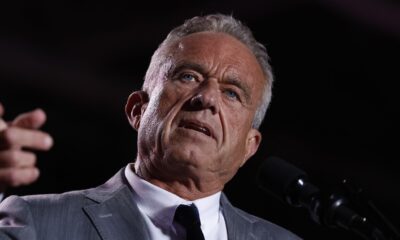Travel
Spain aims to ban golden visas from January – but one country is reintroducing its scheme
The EU is turning its back on golden visas – but one country is reintroducing its scheme.
Getting the right to live and work in another country can be a long and difficult process. But that’s not always the case for those with money to spend.
Golden visas offer the opportunity for wealthy people to essentially ‘buy’ the right to residency – sometimes without even having to live in the country.
And their popularity in the European Union is growing as people look to move away from countries facing instability and political decisions such as Brexit that may limit their safety and rights.
With the unsettled political and social environment in the US in recent years, applications for golden visas from Americans were also projected to increase.
But golden visas are now gradually being phased out across Europe.
Spain has finally secured a legal route to ending golden visas via property investment, with reports suggesting the ban could come into force by January 2025. The ban, which is still being debated, could also affect other investment pathways.
Portugal removed real estate investment as a basis for golden visa applications back in October 2023 in the hope of reducing property speculation.
The Netherlands followed suit, ending its golden visa scheme in January 2024.
But Hungary has bucked the trend by reintroducing its golden visa scheme, with applications open as of this month.
So what exactly are these golden visa schemes and why has the EU raised questions about their safety in recent years?
What is a golden visa?
Residence by investment schemes, otherwise known as ‘golden visas’, offer people the chance to get a residency permit for a country by purchasing a house there or making a large investment or donation.
Any applicants must be over the age of 18, have a clean criminal record and have sufficient funds to make the required investment.
There are also golden passports, known officially as citizenship by investment programs, that allow foreigners to gain citizenship using the same means.
For countries in the EU, this also means gaining access to many of the benefits of being a resident of the bloc – including free movement between countries.
Why is the EU against golden visas and passports?
In 2022, the European Commission called on EU governments to stop selling citizenship to investors.
Though this is different to golden visas, which offer permanent residency rather than citizenship, the call came as part of a move to crack down on this combined multi-billion euro industry. In the wake of the Ukraine war, there were concerns that these schemes could be a security risk.
Brussels also called for countries to double-check whether people sanctioned due to the war were holding a golden passport or visa that they had issued.
In the past, the EU has also said that schemes of this kind are a risk to security, transparency and the values that underpin the European Union project.
In October 2022, the European Commission urged Albania to “refrain from developing an investors’ citizenship scheme (golden passports)”. Such a scheme would “pose risks as regards security, money laundering, tax evasion, terrorist financing, corruption and infiltration by organised crime, and would be incompatible with EU norms,” it warned in a report. The country has since suspended its plans to introduce a golden visa.
Threats also come from outside the bloc. Also in October 2022, the European Commission proposed a suspension of Vanuatu‘s visa waiver agreement due to golden passport risks. This is because the scheme enables nationals of third countries to gain Vanuatu citizenship, which then earns them visa-free access to Schengen zone countries.
Which other countries have scrapped their golden visa schemes?
In February 2022, the UK government scrapped its golden visa scheme that allowed wealthy foreign nationals to settle in the country in exchange for bringing part of their wealth with them. The decision to end the scheme came as part of a move to clamp down on dirty money from Russia.
In February 2023, Ireland also axed its golden visa scheme – the Immigrant Investor Programme – which offered Irish residence in return for a €500,000 donation or three-year annual €1 million investment in the country.
Ireland had already suspended the scheme for Russian citizens in March 2022 as part of sanctions imposed on the country for the invasion of Ukraine. The following month, the European Parliament warned that the programme was vulnerable to tax abuse. The final decision to end the scheme was the outcome of various international reports and internal reviews.
Which EU countries still offer golden visas and what are the requirements?
There are only a few places that still offer golden passports in the EU. One of these countries is Malta. Here, the minimum investment amount starts at €690,000 and offers citizenship for between 12 and 36 months.
Many others, however, still offer golden visa schemes. Here are a few examples of exactly how much it costs to get residence by investment in these countries.
Does Spain still offer a golden visa?
Spain launched its residence by investment scheme in 2013. It allowed wealthy people from outside the EU to obtain residency permits on investing more than €500,000 in real estate or certain types of business.
However, in April, the country’s government said it plans to scrap the real estate route – which accounts for 94 per cent of applications – to reduce pressure on the housing market.
Socialist Prime Minister Pedro Sánchez said the reform was part of his minority coalition government’s push to make housing “a right, not a speculative business”.
The road to banning the visa has been a long and rocky one, having failed to secure parliamentary support from major opposition parties.
According to local media reports, a ban could be on the horizon in January 2025 but applications made before then are likely to be honoured.
The government says over 15,000 such visas have been issued since the measure was brought into law in 2013 by a previous right-wing Popular Party government as a means to attract foreign investors.
Since Spain announced plans to end its golden visa, Chinese investors have rushed to buy property in the country, a report by Spanish state broadcaster RTVE revealed.
The visa can also be gained by starting certain types of business in Spain, holding company shares or bank deposits with a minimum value of €1 million in Spanish financial institutions, or making a government bonds investment of at least €2 million. The ban could extend to these types of investments, also.
Hungary golden visa scheme
Bucking the trend, Hungary announced plans to reintroduce its golden visa scheme in July 2024, after having ended it back in 2017.
The so-called Guest Investor Program (GIP) offers three routes to residency, including through real estate investment funds (minimum €250,000), purchasing a residential property (minimum €500,000) or donating at least €1 million to a higher educational institution in the country.
The visa is extended to the spouse and dependent children of the applicant and grants visa-free travel in the EU.
Initial applications opened at the end of October, with further real estate investment funds expected to be released by the end of the year.
Italy’s golden visa scheme
Italy is another popular destination for those looking to get residence by investment. Introduced in 2017, its golden visa grants non-EU nationals a residence permit for two years in exchange for an investment in Italy.
The minimum investment here is €250,000 which must be done through an Italian limited company. Those holding these visas can also include their family in the application and benefit from a special tax regime.
Once those using the scheme have lived in Italy for 10 years, they can be eligible for citizenship.
Greece’s golden visa scheme
Greece offers golden visas, with one of the quickest processes for gaining residency. Qualifying foreigners can get a permit within 60 days of applying.
It used to have one of the lowest thresholds for investment at just €250,000 spent on property in the country. But the country raised this to €800,000 in September in areas facing severe housing shortages, such as Athens, Mykonos and Santorini.
Elsewhere, it only rose to €400,000 to encourage investment in a wider range of places.
Golden visa holders aren’t required to stay in Greece to keep their visas.
By the end of 2021, the country had seen 9,500 applications for these residence by investment schemes, one of the highest numbers in Europe.
Travel
Afghanistan’s Taliban to attend their first UN climate conference
The Taliban will attend a U.N. climate conference for the first time since their takeover of Afghanistan in 2021, the environment agency said on Sunday.
The conference, known as COP29, begins on Monday in Azerbaijan and is one of the most important multilateral talks to include the Taliban, who do not have outside recognition as the legitimate rulers of Afghanistan.
The National Environmental Protection Agency posted on social media platform X that a technical delegation had gone to Baku to participate.
Matiul Haq Khalis, the agency’s head, said the delegation would use the conference to strengthen cooperation with the international community on environmental protection and climate change, share Afghanistan’s needs regarding access to existing financial mechanisms related to climate change, and discuss adaptation and mitigation efforts.
Experts told The Associated Press that climate change has led to numerous and negative impacts on Afghanistan, creating serious challenges because of the country’s geographical location and weak climate policies.
“Climate change has resulted in higher temperatures, which reduce water sources and cause droughts, significantly affecting agricultural activities,” said Hayatullah Mashwani, professor of environmental science at Kabul University. “The reduction in water availability and frequent droughts pose severe threats to agriculture, leading to food insecurity and challenges to livelihoods.”
In August, the international aid agency Save the Children published a report saying that Afghanistan is the sixth most vulnerable country to the impacts of climate change and that 25 of its 34 provinces face severe or catastrophic drought conditions, affecting more than half the population.
Afghanistan also had the highest number of children made homeless by climate disasters of any country as of the end of 2023, according to the report.
Professor Abid Arabzai, from Kabul University, said the climate conference would help to secure international assistance and funding to address Afghanistan’s climate challenges.
“Afghanistan can clarify its climate actions and commitments to the global community, enhancing its international reputation,” said Arabzai.
Travel
Surrounded on three sides, Kurakhove is Ukraine’s new ‘Bakhmut’
Set on Ukraine’s eastern front, Kurakhove is surrounded on three sides, with Russian forces just under three kilometres from the devastated city centre.
Yet between 700 and 1,000 local residents remain, most of them living in the basements of apartment buildings, without running water, heating or electricity. The only place to charge phones is in the basement of the building now housing the city administration.
The exact number of people is impossible to determine because, since mid-October, no humanitarian volunteers have come to Kurakhove.
Under attack from artillery, multiple rocket launchers, aerial bombs and drones, Kurakhove has become the new Bakhmut, as Russia continues its drive westward to capture all of the Donbas region. On Friday, Ukrainian President Volodymyr Zelenskyy called the situation in Kurakhove, as well as the key city of Pokrovsk, “the most challenging.”
The hospital, schools, kindergartens, water treatment plant, refugee centre, post office, technical school and cultural centre have all been destroyed. Smoke hangs in the air as bombed-out apartment buildings burn against a backdrop of artillery fire and drones.
Artillerymen of the 33rd Brigade say they are firing around 50 shells per day on the Kurakhove front, indicating critical activity in the Russian army’s offensive operations and the brigade’s desperate attempts to stop Russian forces from encircling the city.
Local authorities remain in the city, as well as representatives of the police and local Territorial Defence Forces.
For Artem Shchus, head of police in Kurakhove, there is little hope of defending the city if it becomes surrounded.
“I don’t think it is possible, considering the reality of modern war and modern technologies. In that case, the logistics could be performed only by drones,” he says.
Shchus calls the road to Kurakhove, which is lined with burned-out civilian vehicles, the “road of death,” due to persistent Russian drone attacks. Five civilians have been killed while trying to leave.
No supplies would enter the city without the “White Angels” evacuation group, made up of local police officers and volunteers. They provide first aid to the wounded and remove the bodies of those killed in shelling, all while operating the city’s only functioning food store.
The White Angels bring in vital supplies in an armoured vehicle kitted out with electronic warfare equipment — the only way to enter the city, and still a journey fraught with risk.
“Without REB (jammers) it is just a lottery. With it, you might still have a chance to survive,” Shchus says.
The only way to escape the city is to travel with the White Angels. Each day, they risk their lives to evacuate between six and 12 people from different parts of the city and surrounding villages.
Although children are meant to have been evacuated, parents often hide them, both from the bombs and from law enforcement officers. Among the White Angels’ key missions is to find children and persuade their parents to evacuate.
When this mission is successful and children are removed from the basements, many are shocked by the state of the destroyed city, suggesting that they have been hiding underground for quite some time.
After dressing the children in bulletproof vests and helmets, the White Angels take them to the nearby city of Kostyantynopil, from where other volunteers transport them to refugee registration points in the regional centres of Dnipro or Zaporizhzhia.
“We evacuate people every day without stopping. We just dropped people off in Kostyantynopil, and we still have addresses to go through today,” Shchus explains.
Asked about adapting to work in such challenging and dangerous conditions, the police chief worries about the impact on his team.
“I think everyone has already adapted. I wouldn’t even call it ‘adaptation.’ It’s more like an unhealthy state of mind. I don’t know how this will influence them socially in the future,” he says. “These people are living in inhumane conditions, and they’re surviving on adrenaline. The war is their life. These are hard conditions to work in, but everyone is working.”
Travel
ICC launches outside investigation into its top prosecutor
The International Criminal Court will launch an external probe into sexual misconduct accusations against its top prosecutor Karim Khan.
The external probe will keep alive a case that the court’s internal watchdog had closed within five days.
Karim Khan has categorically denied the accusations that he tried to coerce a female aide into a sexual relationship, and the claims come amid reports of an ongoing Israeli intelligence campaign to discredit the court’s prosecution of Benjamin Netanyahu for alleged war crimes in Gaza.
The external investigation was approved this week at a meeting of the court’s oversight body, the Assembly of States Parties to the Rome Statute, according to three people familiar with the matter who spoke to AP on condition of anonymity to discuss the closed-door deliberations.
It was unclear exactly who would conduct the probe, the people said, noting that possibilities included law enforcement officials from Europe and a law firm. The United Nations’ internal watchdog has also been discussed for such a probe but that could be fraught with conflict-of-interest concerns because Karim’s wife, a prominent human rights lawyer, had previously worked at the agency in Kenya investigating sexual harassment.
Neither Päivi Kaukoranta, a Finnish diplomat currently heading the ICC’s oversight body, nor Khan’s attorney immediately responded to requests for comment.
An AP investigation found that two court employees in whom the alleged victim confided came forward with the accusation in May, a few weeks before Khan sought arrest warrants against Netanyahu, his defence minister and three Hamas leaders on war crimes charges. A three-judge panel is now weighing that request.
AP reported that Khan travelled frequently with the woman after transferring her to his office from another department at the ICC’s headquarters in The Hague.
During one foreign trip, Khan allegedly asked the woman to rest with him on a hotel bed and then “sexually touched her,” according to whistle-blower documents shared with the court’s watchdog and seen by the AP. Later, he came to her room at 3 a.m. and knocked on the door for 10 minutes.
Other allegedly non-consensual behaviour cited in the documents included locking the door of his office and sticking his hand in her pocket. He also allegedly asked her on several occasions to go on a vacation together.
After the two co-workers reported the alleged behaviour, the court’s internal watchdog interviewed the woman but she opted against filing a complaint due to her distrust of the watchdog, according to the AP investigation. Khan was never questioned and the watchdog’s inquiry was closed within five days.
While the court’s watchdog could not determine wrongdoing, it nonetheless urged Khan in a memo to minimise contact with the woman to protect the rights of all involved and safeguard the court’s integrity.
Under Khan, the ICC has become more assertive in combating crimes against humanity, war crimes and related atrocities. Along the way, it has added to a growing list of enemies.
Last September, following the opening of a probe into Russian atrocities in Ukraine, the court suffered a debilitating cyberattack that left staff unable to work for weeks. It also hired an intern who was later criminally charged in the U.S. with being a Russian spy.
Israel has also been waging its own influence campaign ever since the ICC recognised Palestine as a member and in 2015 opened a preliminary investigation into Israel’s actions.
London’s The Guardian newspaper and several Israeli news outlets reported this summer that Israel’s intelligence agencies for the past decade have allegedly targeted senior ICC staff, including putting Khan’s predecessor under surveillance and showing up at her house with envelopes stuffed with cash to discredit her.
An external probe would go further than what Khan proposed when, following the AP report, he called on the ICC’s internal watchdog to investigate the matter and said he would fully cooperate.
-

 Sports6 days ago
Sports6 days agoMilan, Alvaro Morata parties with Rafael Leao
-

 EU & the World6 days ago
EU & the World6 days agoWhat Did Robert F. Kennedy Jr. Say About Fluoride in Drinking Water?
-

 EU & the World5 days ago
EU & the World5 days agoWhich Celebrities Are Leaving the Country After Trump’s Election Win?
-

 Sports7 days ago
Sports7 days agoLazio first wastes, then exults: 2-1 to Cagliari, is third
-

 Sports5 days ago
Sports5 days agoVirtus Bologna regains the top spot but Luca Banchi admonishes his own
-

 Sports7 days ago
Sports7 days agoLazio flies, but standings scare Marco Baroni
-
EU & the World6 days ago
Is the Post Office Open on Election Day? Mail Delivery Today
-

 Sports5 days ago
Sports5 days agoChampions League: Atletico mocks PSG, Barcelona and Bayern do well









